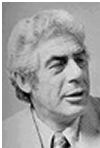Frederick Herzberg
Background
Frederick Herzberg was born in Lynn, Massachusetts on April 18, 1923 and died on January 18, 2000 in Salt Lake City.
He had been in Utah since 1972 when he was asked to join the University of Utah's College of Business.
He gained a graduate degree at the University of Pittsburg.
Before his move to Utah, he was professor of management at Case Western Reserve University where he established the Department of Industrial Mental Health.
He put forward the idea that certain factors in the workplace cause job satisfaction, while others lead to dissatisfaction.
He became known as ‘The Father of Job Enrichment’ and the originator of the ‘Motivation-Hygiene Theory’.
He was a big influence on post-war visionaries such as Abraham Maslow, Peter Drucker and Douglas McGregor.
His book ‘The work and the nature of man’ was voted in the top 10, in 1995, in terms of impacting management theory and practice in the 20th century.
His book 'The Motivation to Work', written with research colleagues B Mausner and B Snyderman in 1959, first established his theories about motivation in the workplace.
This work was based upon the a study using 200 Pittsburgh engineers and accountants.
In 1959 he proposed the ‘Two Factor theory’ of human motivation in the workplace.
According to his theory people are influenced by two factors:
- Satisfaction and psychological growth are a result of ‘motivation factors’
- Dissatisfaction as a result of a lack of ‘hygiene factors’
Most managers realise that a happy workforce leads to improved performance.
Exactly what those factors are has lead to considerable debate.
He suggested two basic needs one as an animal to avoid pain, and the second as a human being to grow psychologically.
Frederick Herzberg, through observational research identified particular areas.
Hygiene factors
During his research, he established that particular factors often caused a worker to feel unsatisfied with his or her job.
These factors seemed directly related to the person's environment, for example, the physical surroundings, other personnel such as supervisors and even the company itself.
He called this his ‘Hygiene Theory’.
For the worker to remain happy these ‘hygiene factors’ should not cause any discomfort.
If so, performance is likely to become affected.
If you make sure the environmental factors are in place the worker will be more efficient in terms of performance.
However, the independent drive associated with motivation may still be lacking.
Hygiene might include:
- Policy
- Relationship with supervisor and other managers
- Work conditions
- Physical environment
- Salary
- Company car
- Status
- Security
- Relationship with subordinates
- Personal life
Motivation factors
Herzberg believed that workers responded to feelings of connection with their work.
This happens by encouraging them to accept more authority as well as promoting feedback.
Motivators might include.
- Achievement
- Recognition
- Work itself
- Responsibility
- Advancement
- Personal growth
- Autonomy
- Intrinsic interests
- Creative opportunities
Money as a motivator
Initially, many people would say that they only work because of the money, ‘if you pay me more I will work harder’ etc. etc.
In fact, money is quite low on the list for most people that are unhappy about their jobs.
If you paid someone money to literally just sit on a stool all day you could pretty much bet there would be plenty of resignations after day one. People need to have an interest in the job that makes it worthwhile.
Many people who change jobs do so because of better promotion prospects, more challenging and varied work, or just a more exciting place of work.
People who win large amounts of money in lotteries etc are never truly happy just spending it, unless it is used for personal fulfilment.


